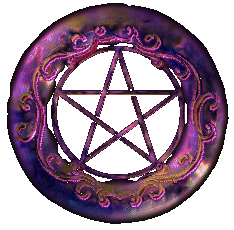

|
Pagans Lounge on MySpace.com  View My Guestbook Sign My Guestbook Main Page Divination Main Page Tarot Divination Cleansing your Cards Making Your Cards Your Own Major and Minor Arcana Tarot Spreads Tarot Spreads 2 Links About Ethereal Projections Advertisements Copyright Submit Info Contact Us |
Introduction To Tarot Submitted by AlleyCat Tarot is a way of developing intuitive skills. No one knows quite where or when Tarot originated, but the Tarot we use today dates back to the mid-fifteenth century. It is a means of self-knowledge. The powerful symbolism of the Major Arcana reflects the principal events in our lives, whereas the Minor Arcana informs us about our circumstances and our experiences, as well as the direction we may be heading. Many people believe that Carl Jung's 'Theory of Synchronicity" is at work when reading Tarot. He proposed that everything in the universe is connected and that the outer world is a mirror to the inner world. So the question we ask Tarot will be reflected in our choice of cards. Developing a relationship with Tarot takes time, patience and practice. You need to become familiar with the designs and symbolism of your particular deck. Write down all the meanings in the book that comes with your cards and then, study each card and write down your own impressions. If you see or feel something that isn't in the book, add it to the list. The card is telling you its hidden meanings. In Tarot, always trust your intuition! Work with your cards often, doing practice spreads or just looking at them and studying the symbolism. Pay attention to how the cards correspond to each other. Sometimes seeing 1 card next to another will give you a new insight into the reading. Every card has several different possible meanings, so studying the surrounding cards will help determine what is being revealed. Tarot is mostly used in divination, but it can also be used as an aid to learning more about our selves. We work more with the powerful symbolism rather than their predictive attributes. Tarot gives us an insight into psychological patterns, spiritual aspirations and the hidden motivations that govern our lives. Tarot cannot foretell a future; it is not a directive and doesn't make decisions for us. What Tarot does is indicate trends and influences that may lead to a particular conclusion. It also serves as a tool for greater self-awareness. Tarot illustrates influences, opportunities and aspects of ourselves that we are either unaware of or have hidden from our conscious mind. First of all, you need to know that every deck of Tarot is different. Some have obvious symbolism and others have very obscure symbolism. You must become familiar with your particular deck. Listen to it for it will speak to you. 1. It's a good idea to make 'cheat cards' so you don't forget a possible meaning. It makes for a more accurate reading. 2. A new deck should be cleansed before giving the 1st reading. 3. You should keep your deck in a box or better yet, a bag or a pouch. 4. I keep my cards in order so as to remove any vibrations from the last reading. Some readers don't do this, but allow the cards to be completely random. It's up to you as to how you handle your cards. Intuition is the key. If it feels right, then do it! 5. Some decks have reversed meanings. I rarely use these, but many readers rely on both upright and reversed meanings. Since I keep my cards in order, it's rare that i would get a reversed card. Again, do what feels right. 6. When choosing your deck, it's important for the deck to 'call' to you. This means you will be drawn to it over all the others. In time, you will probably begin collecting decks. I have 4 standard decks and 3 oracle decks. Basic Tarot Story The Fool settles beneath a tree, intent on finding his spiritual self. There he stays for nine days, without eating, barely moving. People pass by him, animals, clouds, the wind, the rain, the stars, sun and moon. On the ninth day, with no conscious thought of why, he climbs a branch and dangles upside down like a child, giving up for a moment, all that he is, wants, knows or cares about. Coins fall from his pockets and as he gazes down on them - seeing them not as money but only as round bits of metal - everything suddenly changes perspective. It is as if he's hanging between the mundane world and the spiritual world, able to see both. It is a dazzling moment, dreamlike yet crystal clear. Connections he never understood before are made, mysteries are revealed. But timeless as this moment of clarity seems, he realizes that it will not last. Very soon, he must right himself, and when he does, things will be different. He will have to act on what he's learned. For now, however, he just hangs, weightless as if underwater, observing, absorbing, seeing. |
